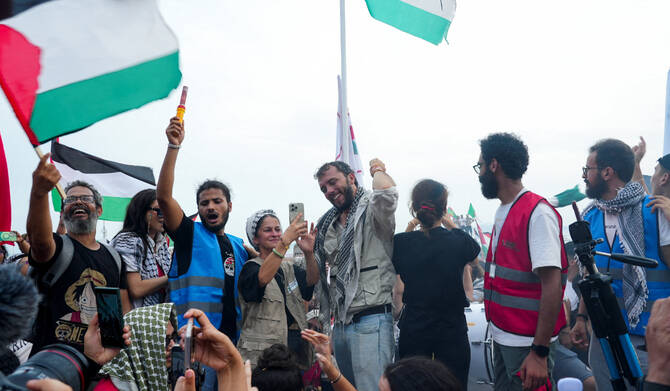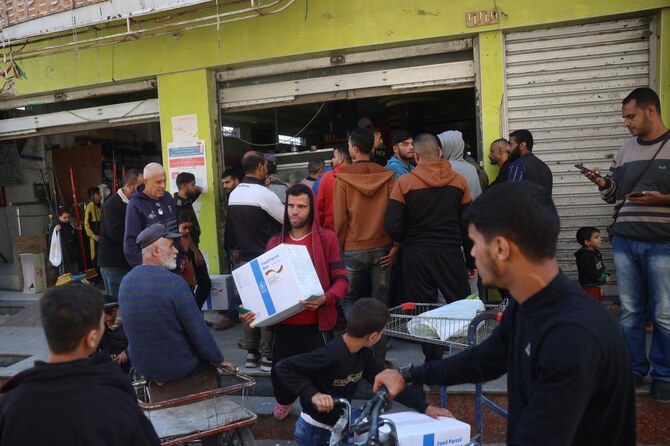GAZA: Faced with major food shortages after nearly 14 months of war, Palestinians describe long days hunting for flour and bread in the conflict-ravaged Gaza Strip.
Every morning crowds form outside the few bakeries open in the Palestinian territory, as people desperately try to get a bag of bread at distribution points.
Since the outbreak of war in Gaza last year, charities and international aid organizations have repeatedly warned of crisis levels of hunger for nearly two million people.
A United Nations-backed assessment last month warned of famine looming in the northern Gaza Strip amid a near-halt in food aid after Israel launched an offensive in the area.
Essential goods like water, fresh produce and medicines are also scarce.
Gazans across the territory have told AFP in recent months how they wake up at the crack of dawn just to ensure they can get some flour or bread, with current availability reaching an all-time low.
In the southern city of Khan Yunis, AFP photographers saw dozens of people at a distribution point, bodies pressed against each other.
Over each other’s heads, everyone tries to reach out as far as possible to grab the round bread.
A small child, her face covered in tears, squeezes a coin between her fingers as she makes her way through the crowd of adults.
“I walked about eight kilometers (five miles) to get bread,” Hatem Kullab, a displaced Palestinian living in a neighborhood of makeshift tents, told AFP.
It was in the middle of one of these crowds that two women and a child were trampled to death in a stampede at a bakery in the central Gazan city of Deir el-Balah Friday.
“To get a loaf of bread you need a whole day of eight to 10 hours,” said the brother of one of the women killed, describing his sister’s ordeal as she tried to get bread to feed 10 family members.
“The suffering that my sister went through is suffered by all the Palestinian people,” Jameel Fayyad told AFP, criticizing what he described as poor management of the bakeries.
Fayyad’s anger was largely directed at Israel, but he also blamed the World Food Programme (WFP) and “traders who want to make money on the backs of people.”
Palestinians from across the Gaza Strip told AFP journalists that it is extremely difficult to find the 50-kilogram (110 pounds) bags of flour that would last them several weeks before the war.
“There is no flour, no food, no vegetables in the markets,” Nasser Al-Shawa, 56, said, who, like most residents, was forced to leave his home because of the bombings and lives with his children and grandchildren in central Gaza.
Shawa, who now lives in a friend’s house in Deir el-Balah, says a 50-kilogram bag costs between 500 and 700 shekels ($137 and $192).
Before the war, it cost around 100 shekels.
Inside Gaza where more than half of the buildings have been destroyed, the production is at an almost complete standstill. Flour mills, warehouses storing flour and industrial bakeries are unable to function because they have been so heavily damaged by strikes.
Humanitarian aid is trickling in but aid groups have repeatedly slammed the many constraints imposed on them by Israel, which the country denies.
In the latest blow, the UN agency supporting Palestinian refugees (UNRWA) announced Sunday it was halting aid deliveries to Gaza via a key crossing point with Israel.
UNRWA said delivery had become impossible, partly due to looting by gangs.
For Layla Hamad, who lives in a tent with her husband and seven children in southern Gaza’s Al-Mawasi, UNRWA’s decision was “like a bullet to the head.”
She said her family had regularly received “a small quantity” of flour from UNRWA.
“Every day, I think we will not survive, either because we will be killed by Israeli bombing or by hunger,” she said. “There is no third option.”
The majority of private companies that Israel had in the past allowed to bring in food to Gaza say they are no longer able to do so.
The war in Gaza broke out after Hamas’s October 7, 2023, attack on southern Israel, which resulted in the deaths of 1,208 people, mostly civilians, according to an AFP tally based on official data.
Israel’s retaliatory military campaign in Gaza has killed at least 44,502 deaths, also mostly civilians, according to data from Gaza’s Hamas-run health ministry that the UN considers reliable.
Gazans walk miles for bread and flour amid war shortages
https://arab.news/vadyd
Gazans walk miles for bread and flour amid war shortages

- Every morning crowds form outside the few bakeries open in the Palestinian territory, as people desperately try to get a bag of bread at distribution points
- Essential goods like water, fresh produce and medicines are also scarce
Pro-Palestinian flotilla announces new mission to Gaza

- Israel controls Gaza's borders and scrutinises all aid coming into the territory
TUNIS: A flotilla of pro-Palestinian activists who attempted to reach Gaza last year will set sail for the besieged territory again next month, one member told AFP on Friday.
The Global Sumud Flotilla said the new mission set for March 29 would be "the largest coordinated humanitarian intervention for Palestine in history" and will mobilise "thousands from over 100 countries".
"We will be sailing from Barcelona, Tunis, Italy and many other ports not yet made public," Brazilian activist Thiago Avila told AFP.
The group said an overland convoy would also leave for Gaza on the same day, without specifying from where.
The campaigners sought to break an Israeli blockade by delivering aid to Gaza by sea last October, before they were intercepted by Israel, detained and deported.
Israel controls Gaza's borders and scrutinises all aid coming into the territory.
The activists describe their actions as a "non-violent response to genocide, siege, mass starvation, and the destruction of civilian life in Gaza".














